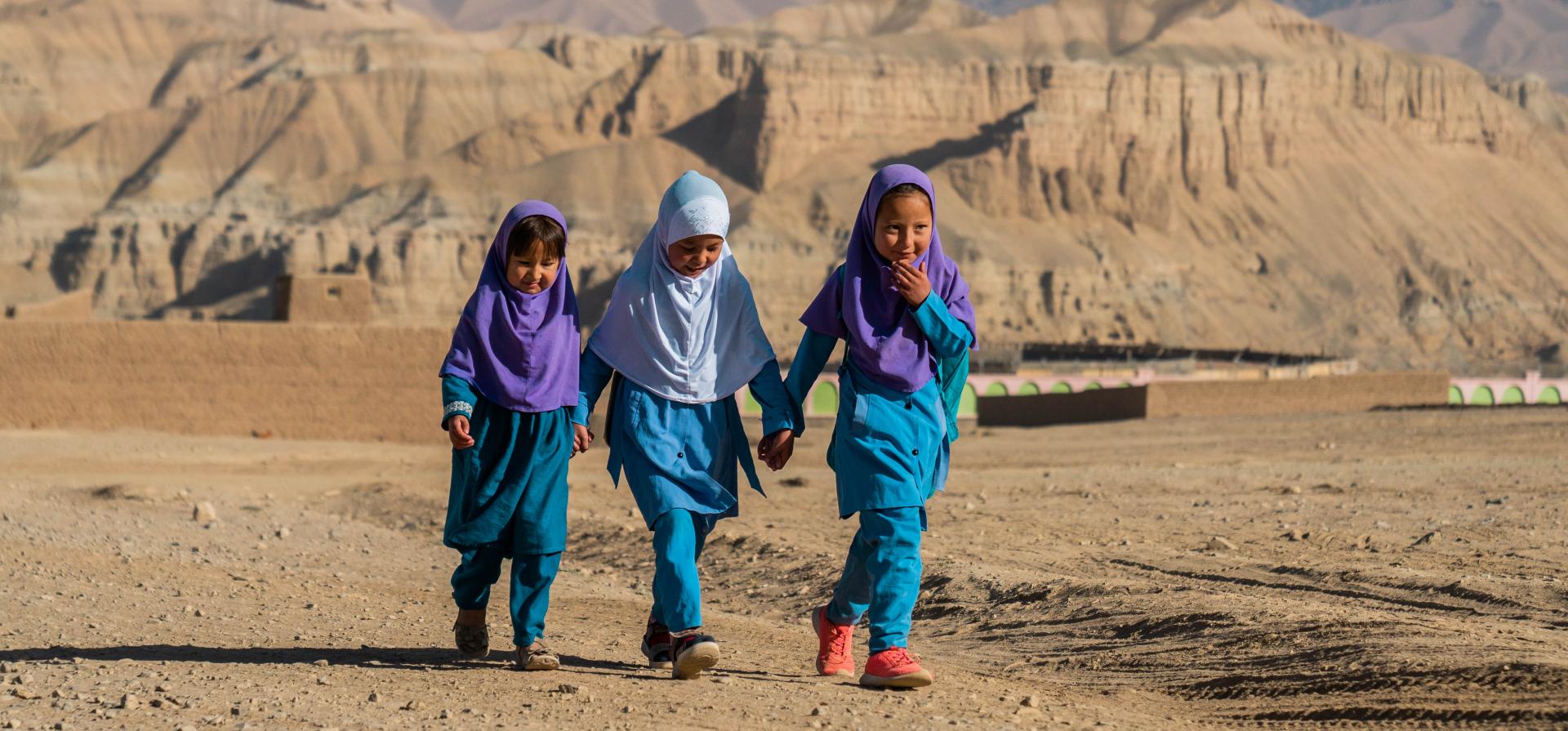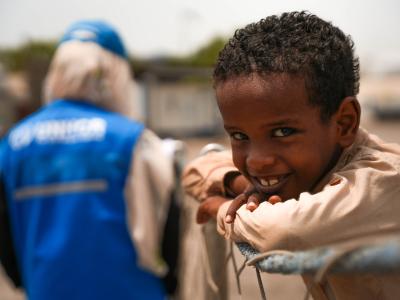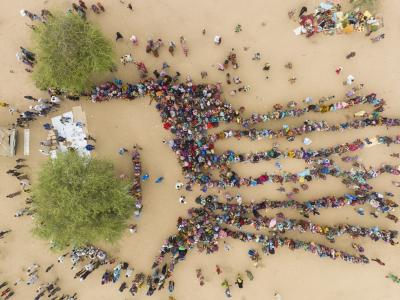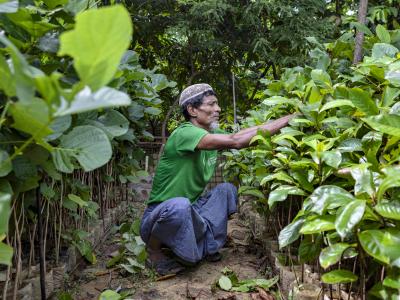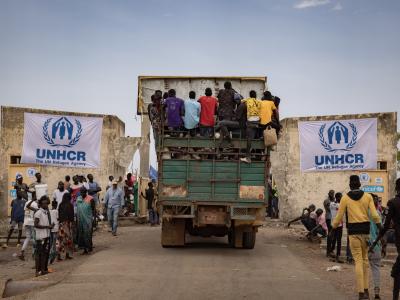Regional overview
The two major displacement situations in the Asia-Pacific region became more challenging and attracted less funding in 2023. UNHCR sought to shore up the protection of refugees, other forcibly displaced as well as stateless people, to address and reverse signs of fatigue among donors and host States, and to counter online misinformation, disinformation and hate speech.
In Afghanistan, UNHCR's efforts to protect and assist returnees, internally displaced people, refugees and asylum-seekers were hampered by a ban on women working for the UN and other national and international organizations. Despite this, UNHCR assisted over 1.52 million people, reaching all of Afghanistan’s 34 provinces. Almost 80% of those assisted were women and children. UNHCR provided much-needed cash assistance to 363,000 people and assisted 75,300 Afghans returning to Afghanistan from the Islamic Republic of Pakistan. However, far larger numbers of Afghans – more than 1.1 million people – were deported from the Islamic Republic of Iran or returned under Pakistan’s “Illegal foreigners’ repatriation plan”. Although the number of returns from Pakistan slowed towards the end of the year, UNHCR continued to advocate globally against the involuntary returns of Afghans in view of its non-return advisory as well as for safe and voluntary returns and a screening mechanism to identify individuals in need of international protection. International partners at the Global Refugee Forum backed a multistakeholder pledge that aimed to support displaced Afghans in Afghanistan and the principal countries hosting Afghan refugees in the spirit of responsibility-sharing.
Armed conflict intensified across Myanmar. Over 700,000 people fled their homes in the last three months of 2023, bringing the total number of those internally displaced to 2.6 million. With roads and waterways closed, supplies of household goods and essential services ran out and inflation skyrocketed. Despite the escalating violence and frequent interruptions to communications, UNHCR’s 12 offices across the country delivered critical support to displaced and conflict-affected communities, reaching around 425,000 people with core relief items. 130,000 people benefited from community-based projects and 47,000 received cash assistance. UNHCR urged governments in the region to grant access to territory to Rohingya and other newly arriving refugees fleeing the new surge in fighting. UNHCR sought to enhance the resilience of nearly 1 million Rohingya refugees in Cox’s Bazar and Bhasan Char in Bangladesh.
Almost 300,000 refugee children were able to go to primary and secondary school, with many Rohingya students following the Myanmar curriculum. UNHCR continued to operationalise the Government of Bangladesh-endorsed UN multi-year formal vocational skills development project for refugees and host communities, which saw close to 3,500 refugees (56% women) complete vocational skills training in Cox’s Bazar and Bhasan Char. To support the Government of Bangladesh’s efforts to enhance security in the camps, UNHCR provided technical support to ensure protection-sensitive and community-responsive policing.
UNHCR advanced a comprehensive regional approach to finding solutions for Rohingya refugees and sustaining support for host countries, with a focus on safeguarding the right to return, building refugee and host community resilience and maintaining support for the response. UNHCR mobilized international support for the Rohingya at a high-level meeting in Bangkok in October, leading up to a multistakeholder pledge at the Global Refugee Forum in December. UNHCR also pressed the authorities in Myanmar for predictable access so that UNHCR and UNDP could implement community-led projects in Rakhine State.
The year 2023 was the deadliest since 2015 for maritime movements in the region. Nearly 4,500 Rohingya refugees, mainly women and children, embarked on perilous sea journeys, and 569 were reported as dead or missing. Widespread physical abuse, including gender-based violence, was reported by the survivors. To enable a more effective and predictable response to onward movements over land and sea, UNHCR initiated a route-based approach, which included efforts to enhance protection-sensitive entry systems and admission procedures, safe disembarkation, and humanitarian assistance to address immediate needs.
UNHCR was able to submit more refugees as candidates for resettlement in 2023 than in 2022 - it submitted over 39,000 refugees living in Bangladesh, the Islamic Republics of Iran and Pakistan, Malaysia and Thailand for resettlement consideration, an 86% increase. An estimated 8,500 individuals took complementary pathways, seeking to find their way out of displacement by travelling to a new country to work, study, or reunite with family. UNHCR also worked to help States in the region identify, reduce and prevent statelessness.
Climate change is making life even more precarious for people who have been forced to flee in the region and the communities that host them. UNHCR and its partners accelerated their efforts to raise funds for emergency responses and recovery from extreme weather events such as cyclones and earthquakes. They also advocated for the inclusion of forcibly displaced people in climate adaptation and resilience building, and advanced innovative partnerships, distributing solar panels to some 83,000 in Afghanistan and reforesting more than 11 hectares in Bangladesh.
Regional expenditure and budget
$575 million spent against a budget of $1.015 billion
$440 million of unmet needs or 43% of the budget
Population overview
Financial overview
Trends in response
Multisectoral monitoring results
Protection

Child protection

Accountability to
affected populations

Basic needs


Shelter

Health



Nutrition

2.5 million people received protection services*
2022 result: 3.3 million
*Protection services encompasses a vast range of community-based, individual and household interventions in various domains of UNHCR protection work, including counselling and information on rights, sensitization on protection issues, community outreach and mobilization, specialized services for children or other persons with specific needs, GBV programming, legal assistance, registration and documentation, Refugee status determination and resettlement case-work, protection monitoring.
886,000 children received protection services*
2022 result: 1.5 million
90% of countries in the region had child protection services* available to displaced and stateless children
*Child protection services include support through Best Interests Procedures for children at risk, targeted support for children with specific needs and children in alternative care, support through family tracing and reunification, and reintegration support for children associated with armed groups and forces.
73% of targeted countries had a multi-channel feedback and response system that was designed based on consultations with displaced and stateless people
2022 result: 73%
1.8 million people received cash assistance
2022 result: 1.6 million
1.2 million people received non-food items, including core relief items*
Indicator not available in 2022
*This indicator reflects the total number of people who benefited from the direct distribution of in-kind non-food items, including domestic Core Relief Items (CRIs) and excluding shelter CRIs.
646,000 people received shelter and housing assistance*
Indicator not available in 2022
*Shelter and housing assistance includes emergency, transitional and durable shelter provision, collective shelter, shelter repair and maintenance, and rental programming.
4.3 million people received essential healthcare services
2022 result: 2.9 million
161,000 women and girls received sexual and reproductive health services*
2022 result: 189,300
*Sexual and reproductive health services include antenatal care, assisted delivery, postnatal care, family planning services and health services for survivors of gender-based violence.
338,000 people received mental health and psychosocial support services
2022 result: 624,400
16,500 children 6-59 months were admitted for treatment of moderate acute malnutrition (MAM)
2022 result: 16,200
3,700 children 6-59 months were admitted for treatment of severe acute malnutrition (SAM)
2022 result: 3,000
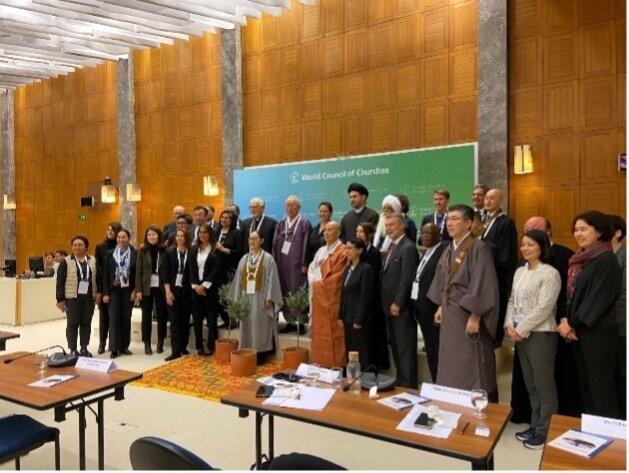

Japanese religious organizations and business federation encourage their members to support refugees
Partnerships with Japanese faith-based organizations and Keidanren, the Japan Business Federation, unlocked significant support for refugees in Japan and beyond in 2023. Keidanren amplified UNHCR emergency appeals among its member companies, and three major Buddhist organizations (the Japan Buddhist Federation, Rissho Kosei Kai and Soka Gakkai) similarly helped raise funds and awareness about the refugee cause among their followers. These organizations solidified and expanded their commitment through pledges at the Global Refugee Forum in December. Keidanren expressed its commitment to strive to provide solutions-driven refugee assistance that leverages the resources, technology and expertise available in Japanese businesses.
Situations
Operations*
Afghanistan | Bangladesh | Islamic Republic of Iran | Kazakhstan Multi-Country Office | Myanmar | Pakistan | Tajikistan | Thailand Multi-Country Office
*The operations listed above are the ones with annual results reports available on Global Focus for 2023.
